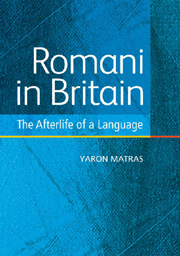Book contents
- Frontmatter
- Contents
- List of Figures, Tables and Maps
- List of Abbreviations
- Preface
- 1 Angloromani: A Different Kind of Language?
- 2 The Roots of Romani
- 3 The Historical Position of British Romani
- 4 The Structural Composition of Angloromani
- 5 The Conversational Functions of Angloromani
- 6 Conclusions: The Decline, Death and Afterlife of a Language
- Appendix I Lexicon of Angloromani
- Appendix II Predecessor expressions by origin
- References
- Author Index
- Subject Index
1 - Angloromani: A Different Kind of Language?
Published online by Cambridge University Press: 12 September 2012
- Frontmatter
- Contents
- List of Figures, Tables and Maps
- List of Abbreviations
- Preface
- 1 Angloromani: A Different Kind of Language?
- 2 The Roots of Romani
- 3 The Historical Position of British Romani
- 4 The Structural Composition of Angloromani
- 5 The Conversational Functions of Angloromani
- 6 Conclusions: The Decline, Death and Afterlife of a Language
- Appendix I Lexicon of Angloromani
- Appendix II Predecessor expressions by origin
- References
- Author Index
- Subject Index
Summary
Gypsies and Travellers in Britain
Britain has at least three distinct ethnic minorities that are usually referred to as ‘Travellers’ or ‘Gypsies’: the English (and Welsh) Gypsies, the Irish Travellers and the Scottish Travellers. They are all best recognisable by their preference for living in caravans (‘trailers’) in either temporary or semi-permanent dwelling sites and by their traditional specialisation in itinerant service-providing occupations. Members of the first group usually refer to themselves in everyday conversation as ‘Gypsies’, or more specifically as ‘English Gypsies’ (or in some families ‘Welsh Gypsies’). They have a special vocabulary that they use in interaction among themselves, which they call ‘Romanes’. Some refer to various other aspects of their culture, values and lifestyle as ‘Romany’, and some refer to their community as ‘Romanichal’. This book is about the speech form used by members of this community: the Romani speech of English and Welsh Gypsies, also called ‘English Romanes’, or in the scholarly literature ‘Angloromani’.
The story of Angloromani begins with the arrival of Romani-speaking population groups – the Roms or ‘Roma’ – from continental Europe in Britain, from the early sixteenth or perhaps even from the late fifteenth century onwards. It is quite likely that England, and perhaps also Wales, had had indigenous Traveller populations prior to the arrival of the Roms. Like other indigenous European Traveller groups they specialised in providing itinerant services, maintained a tight-knit community structure based predominantly on kinship relations and valued marriage strictly within their own community, thereby constituting in practice an ethnic minority, albeit one whose boundaries may have been less hermetically sealed to outsiders than those of geographically settled ethnic or religious minorities.
- Type
- Chapter
- Information
- Romani in BritainThe Afterlife of a Language, pp. 1 - 30Publisher: Edinburgh University PressPrint publication year: 2010



